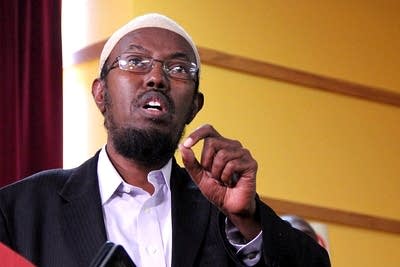Kenya attacks condemned by Somali-American community in Minnesota
Go Deeper.
Create an account or log in to save stories.
Like this?
Thanks for liking this story! We have added it to a list of your favorite stories.

The terrorist attacks in a shopping mall in Nairobi, Kenya, are reverberating in Minnesota.
On a day when there were no clear answers about the identity of the gunmen, religious leaders from the Twin Cities' Somali-American community moved swiftly to condemn the attacks and offer prayers for the victims -- while quietly hoping the attackers weren't from their community.
On Sunday, a Twitter account purporting to represent the terror group al-Shabab released names of the alleged attackers. It said two of the men were from Minneapolis and St. Paul.
But veteran Somali journalists soon determined the Twitter account was fake. Al-Shabab -- or at least an email address claiming to be al-Shabab -- released a statement this morning essentially denying that it issued the tweet.
Turn Up Your Support
MPR News helps you turn down the noise and build shared understanding. Turn up your support for this public resource and keep trusted journalism accessible to all.
Despite that uncertainty, CNN reported Sunday that two of the attackers were Minnesotans, citing "sources within al-Shabab." The network later backtracked from that claim.
"They are an organized gang of ... criminals who have conspired to kill and destroy innocent lives."
Mohamud Noor, the director of the Confederation of Somali Community in Minnesota, said he's dismayed by what he considers reckless reporting.
"We have to be more cautious about the repercussions," said Noor from the Brian Coyle Community Center, as he looked out the window at a throng of news cameras. "We have to be more careful not to assume the names are legitimate."
Despite his restraint, Noor said it's important for Somali leaders like himself to respond quickly to the news -- even when they don't have the answers themselves.
Since Sunday, news crews from across the United States have descended on Minneapolis to see if there's any connection between Somali-Americans in the Twin Cities -- a recruiting base for the terror group al-Shabab - and the attacks in Kenya's capital.
Around a soccer field in the Cedar-Riverside area of Minneapolis on Monday, smiling and breathless schoolchildren had to share the park with a swarm of TV crews and news producers who took turns interviewing one man.
Abdirizak Bihi, an outspoken activist against extremism in his backyard, said he was interviewed several times Monday by CNN.
"They have about four different shows," Bihi said. "I'm getting really confused who I am talking to."

Meanwhile, Imams gathered at Abubakar As-Saddique, the largest Somali mosque in the state, where an FBI investigation concluded that some of the Minnesota fighters were recruited secretly by their peers over the past six years.
Kenyan-born Ibrahim Baraki, who sometimes worships at the mosque, said the attackers may claim to follow Islam, but they are not Muslim.
"They do not represent any religion. They do not represent any community. They do not represent any nationalities," Baraki said. "They are an organized gang of ... criminals who have conspired to kill and destroy innocent lives."
Neither Baraki nor the imams agreed to take any questions. They said they didn't have any solid information regarding the attacks.
But one thing is clear: local Somalis are intricately tied to the victims.
Abdi Mohamed, who came to the mosque to hear from the imams, said one of his own relatives was one of the first victims at the mall attacks. He said his cousin was enjoying a cup of coffee with his wife when he was shot to death.
Mohamed said Somalis around the world are grieving about the hurt and chaos inflicted by al-Shabab.
"[With] al-Shabab, we are the first victims, always, when it comes to Somalis," he said. "We've been dealing with this for the past eight to nine years. Someone you know, they get killed. We are just helpless."
An FBI spokesman said authorities continue to monitor reports of possible connections between Minnesotans and the violence in Kenya, but declined to comment further.
Community members acknowledge that it's possible some of the attackers had Minnesota ties. Six years ago, the first of about two dozen young men slipped away to the Horn of Africa to join al-Shabab. Some are still at large; some have been killed.
At the Brian Coyle Center, Mohamud Noor said the community has worked hard since then to rebuild its image and reach out to young people.
"And now we're back to square one," he said. "It seems like the cycle will never end until we make good progress in terms of making sure no child who lives here join al-Shabab."





